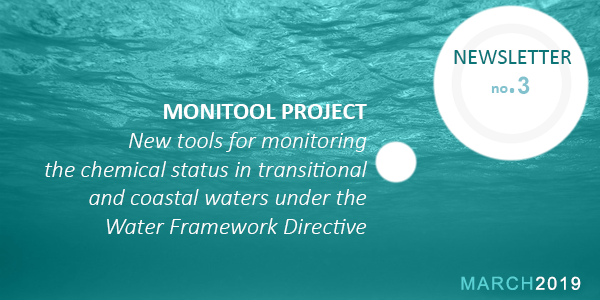The MONITOOL project aims to provide a robust database of dissolved and labile metal concentrations in transitional and coastal waters for adapting the existing water Environmental Quality Standards (EQS; 0.45 μm filtered) for Diffusive Gradients in Thin-films (DGT) passive sampling devices (EQS-DGT) in order to improve and facilitate the chemical status assessment of waters under the Water Framework Directive (WFD).
IFREMER organize an interlaboratory DGT exercise
In the framework of the MONITOOL project, Work Package 5, it was decided to set up an intercomparison exercise on the treatment and analysis of DGTs after exposure. The general objective of the exercise is to assess the potential function and the efficiency of DGTs for trace metals monitoring in surface and coastal waters in the context of the Water Framework Directive (WFD).
DCU analyses biofouling on MONITOOL DGTs
Within the MONITOOL project, it is important to assess the extent to which biofouling occurs on DGTs deployed during the project. Assessment of biofouling is being investigated by Dublin City University, the partner coordinating the project.
MONITOOL obtains first promising results from Database Management and correlation studies
The general objective of the Work Package 4 is to develop a database that allows the compilation and interchange of all information generated during the study.
UNICA promotes the application of the MONITOOL approach for other organic compounds
The University of Cagliari (UNICA) has carried out two sampling campaigns (winter and summer) in the Harbour of Cagliari, including the use of DGTs (for metals) and SR and POCIS (for organic pollutants).
ITC will organize 2 technical conferences in the days preceding the next partners´ meeting in Canary Islands
The aim of these events is to present the MONITOOL project, to disseminate the use of most commonly used passive sampling techniques to evaluate chemical status of waters and to present in depth the DGTs.
This project (No. contract EAPA_565/2016) is co-financed by the European Regional Development Fund through the Interreg Atlantic Area Programme (2014-2020).
Interview with Thi Bolam
Thi Bolam, who leads Work Package 5 (Field sampling and analysis) of the Interreg funded MONITOOL project, is a marine chemist with over 18-year experience working on trace metal and organotin levels in the marine environment and she is currently based at the Cefas Lowestoft laboratory.
Upcoming Events
02 APR 2019
Lisbon
Final meeting of the NOTICE COST Action TD1407 – Network on Technology-Critical Elements.
21-22 MAY 2019
Tenerife / Gran Canaria
Jornada Técnica sobre Muestreadores pasivos para el control de las aguas costeras Proyecto MONITOOL.
26-30 MAY 2019
Helsinki
SETAC Europe 29th Annual Meeting. One Environment. One Health. Sustainable Societies.

